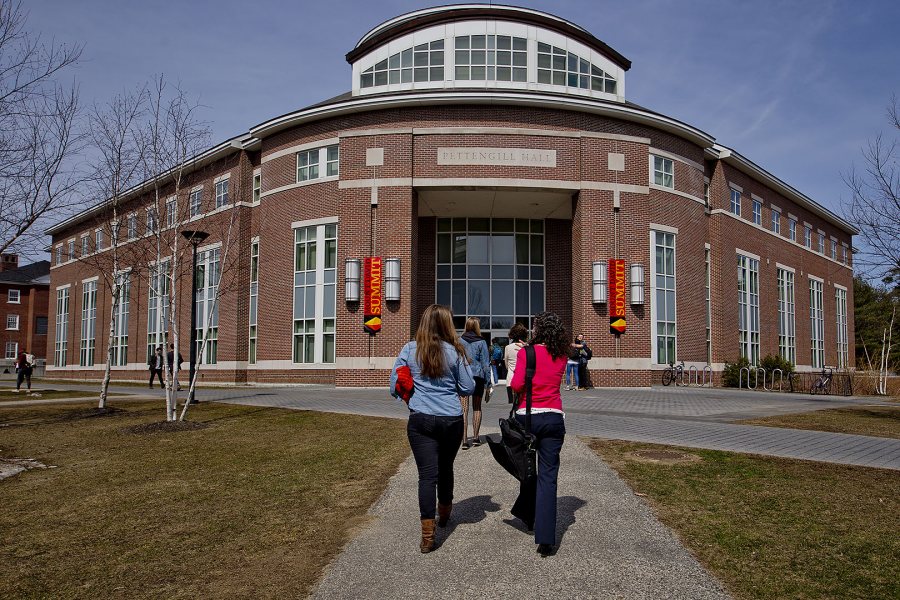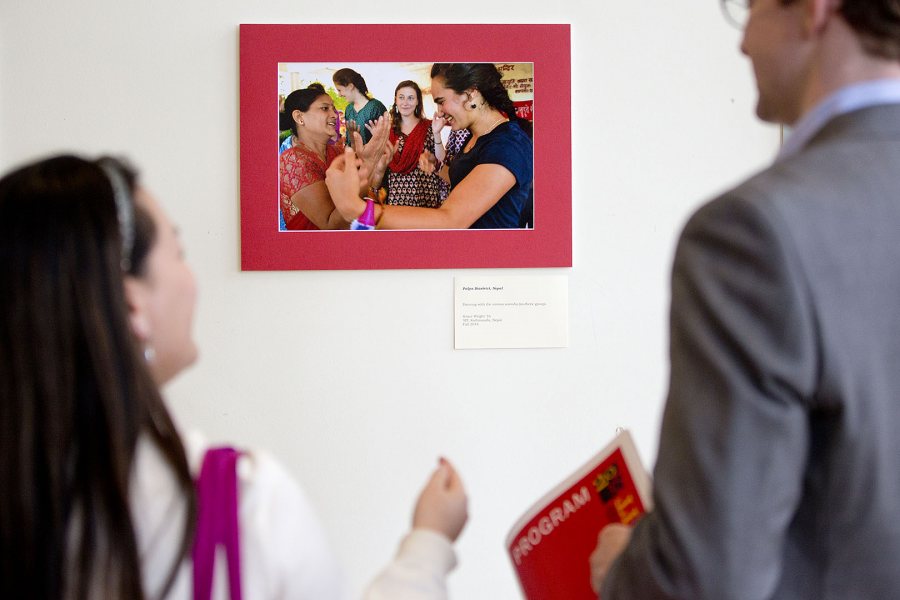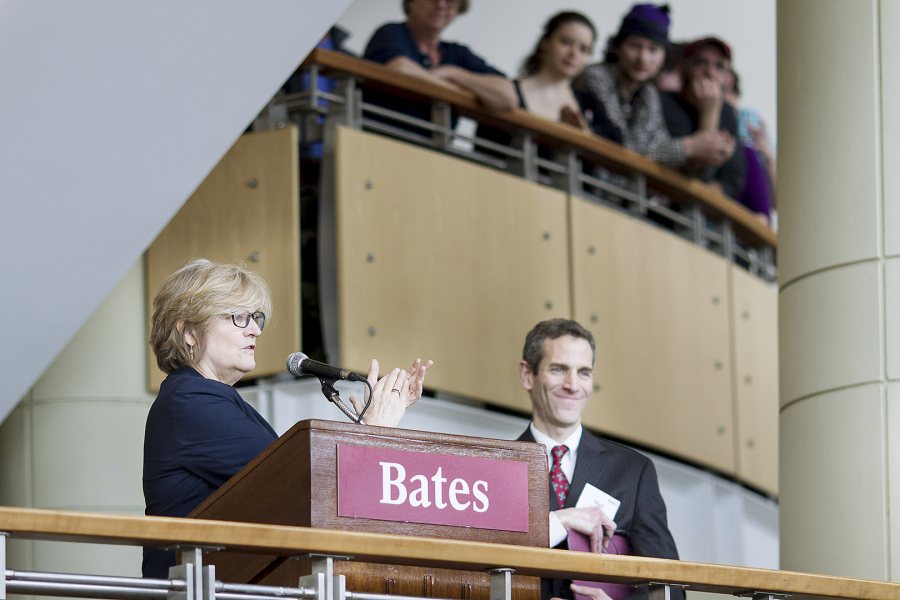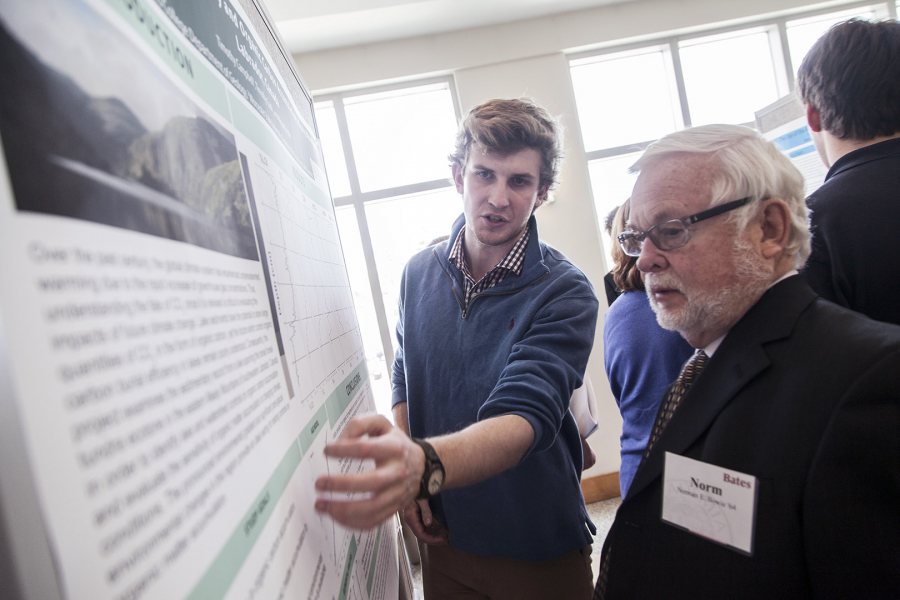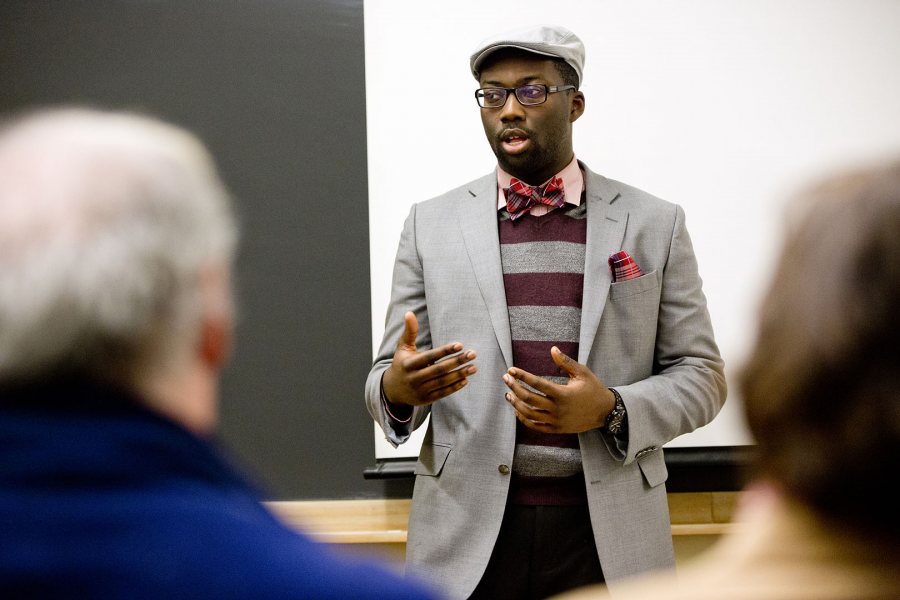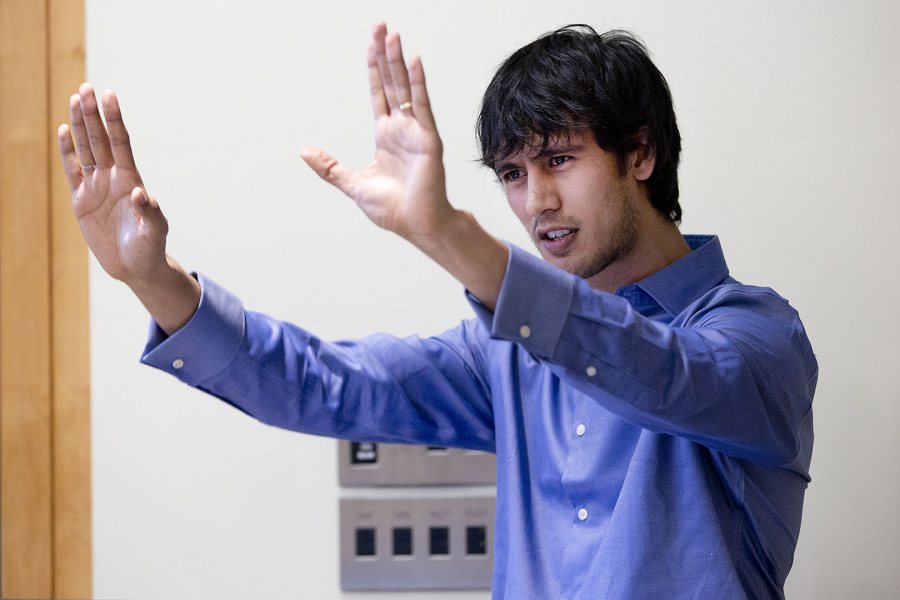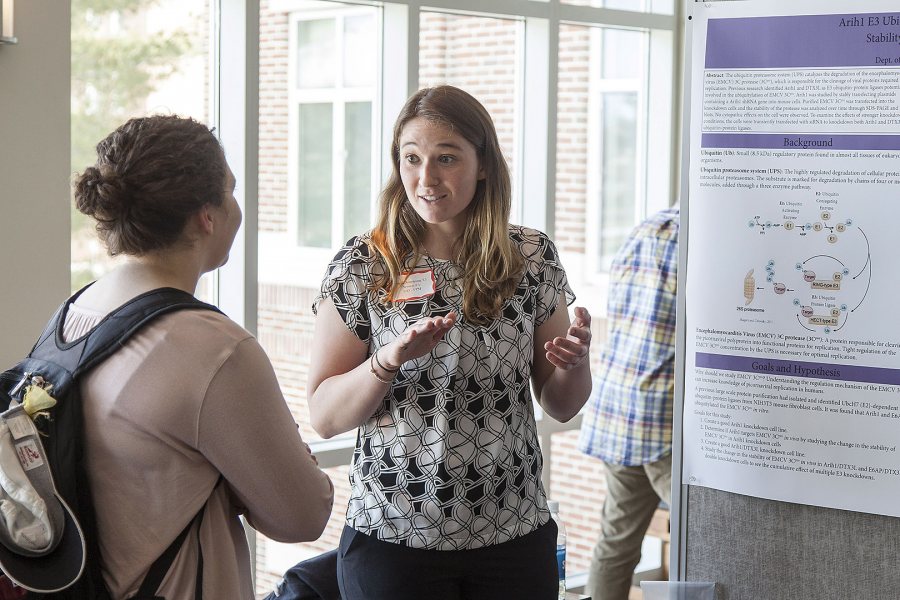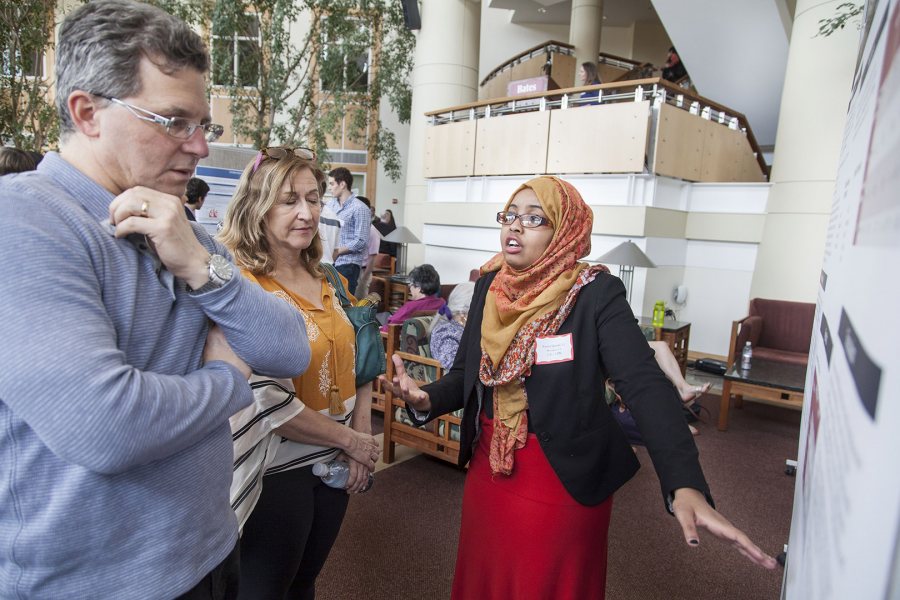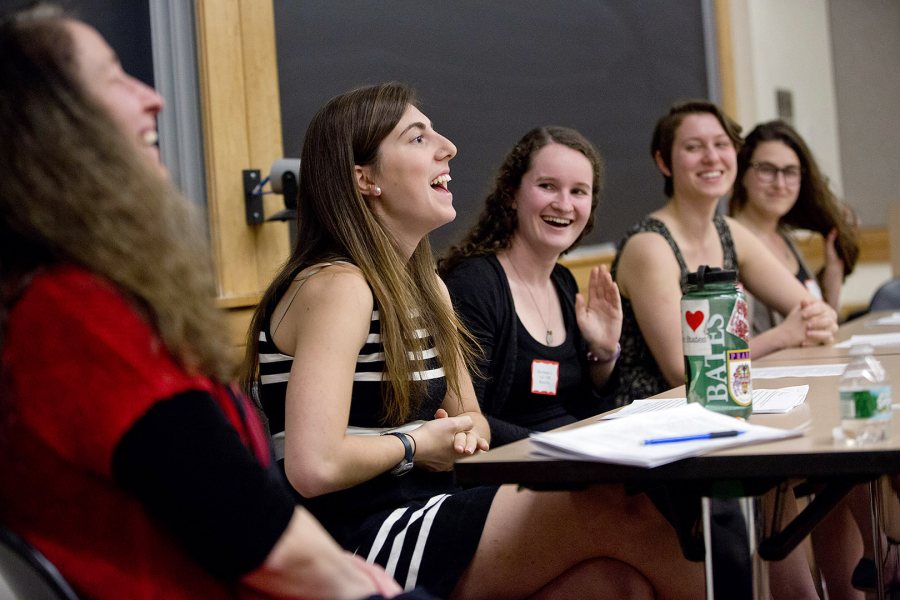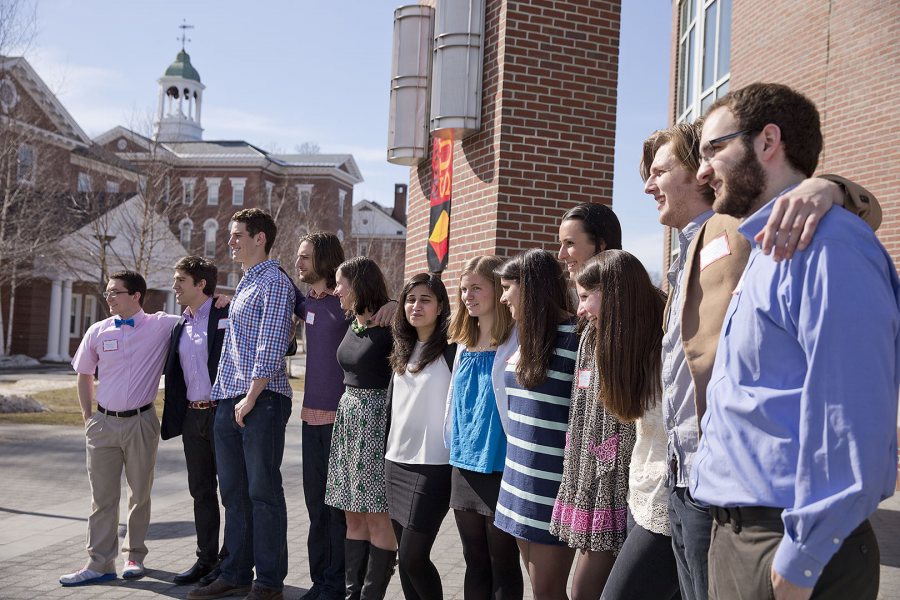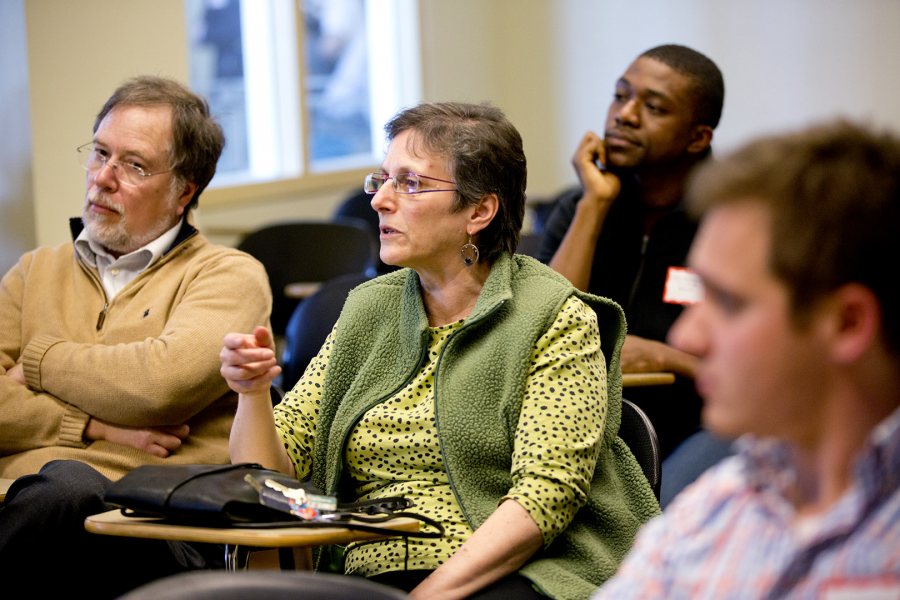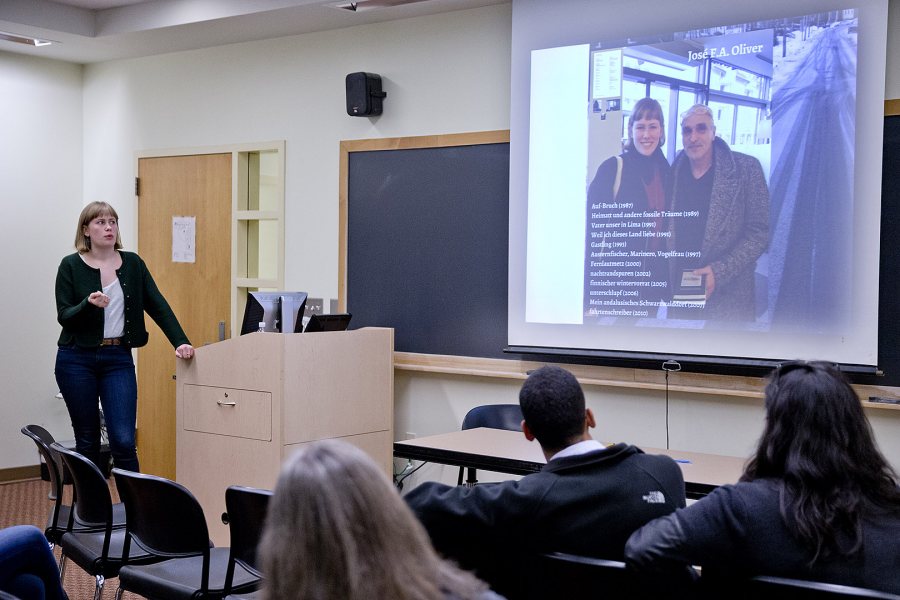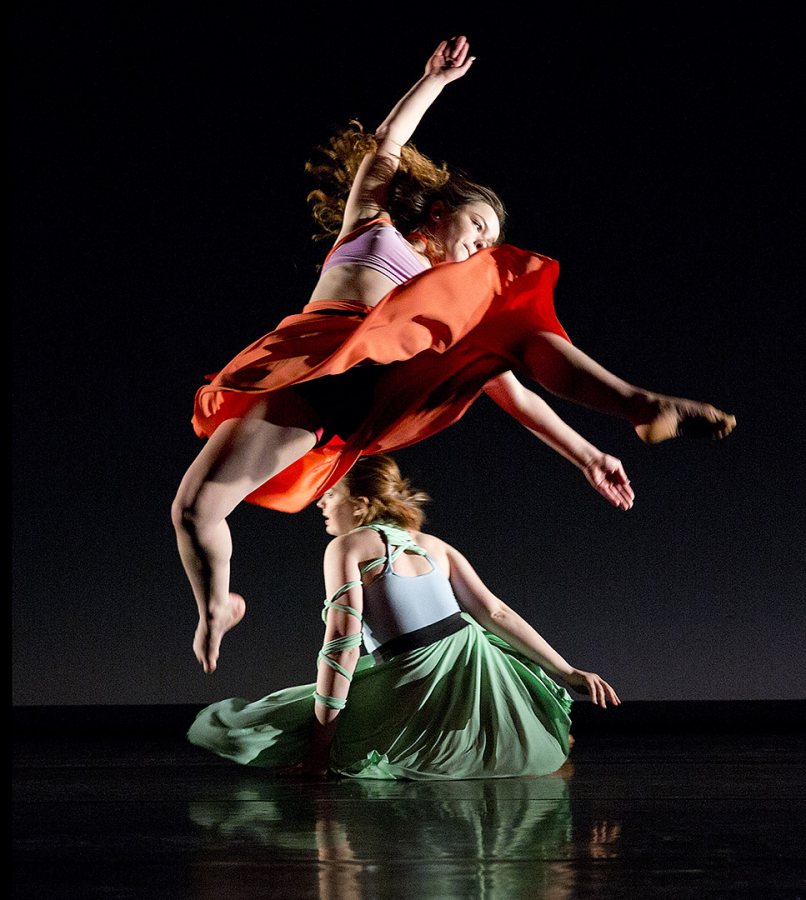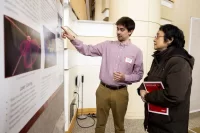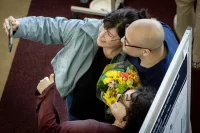
Multimedia: Mount David Summit in words, video, photographs and audio
Members of the Bates Communications Office share what they experienced during the 2015 Mount David Summit.
12:59 p.m. — Alumni Walk
Guests arrive for the 14th annual Mount David Summit on a sunny day of nearly miraculous warmth.
1:02 p.m — Perry Atrium
As guests arrive, Patrick Tolosky ’15 of Longmeadow, Mass., who studied in Peru as a junior, and Hannah Tolan ’17 of New York City, who will study in London next year, view a photograph from the Barlow Off-Campus Study Photography Exhibition, a traditional offering during the Mount David Summit.
The photograph was taken by Grace Wright ’16 of Amherst, Mass., who studied in Kathmandu, Nepal, on the SIT Program with support from the Bates Off-Campus Study Program. The caption reads, “Dancing with aamaa samuha (mothers’ group).”
1:34 p.m. — Third Floor Alcove, Perry Atrium
Hear this year’s “Call to the Summit,” featuring Fanfares of St. Charbel by Michel Rondeau, performed by trumpeters James Jhun ’16 of Roxbury Crossing, Mass., and Alexander Perrone ’16 of Natick, Mass.
1:36 p.m. — Second Floor Alcove, Perry Atrium
Bates President Clayton Spencer welcomes the throng — more than 370 students primed and ready share their research and creative work — to the 2015 Mount David Summit:
“The summit is just one day in the year and one day in our students’ academic journey. But what lies behind this and what we celebrate today is the process of continual discovery that is the Bates experience.
“The cool part of the Bates experience is…it’s not a lonely and isolated journey. Our students are doing their work with each other, in close collaboration with faculty, in a residential community, and this festival is an enactment of that. To me, to paraphrase [poet Rainer Maria] Rilke, this day is a monument to the energy and wonder of having the courage to live the questions.”
1:48 p.m. — Main Floor, Perry Atrium
“Few studies have been done in this area,” says geology major Tim Campbell ’15 of Wolfeboro Falls, N.H.
He was talking about his thesis project, in which he examined sediment cores taken from lakes located in the Mealy Mountains of Labrador, Canada.
Advised by Bates geologist Mike Retelle, Campbell joined a project overseen by geologist Tim Cook of Worcester State University. The project has two goals: to learn how the accumulation of organic carbon changes over time, and to reconstruct the area’s climate history and carbon storage in the lakes. The field area is situated in a critical area of transition at treeline between the the boreal forest and tundra.
Campbell says that “current studies have looked at how the lakes change year to year due to climate change. Nothing has been done on a multi-thousand-year time scale.”
Why did the researchers choose this project? “Because these questions haven’t been answered yet,” Campbell says. Finding the answers, he says, will bring greater understanding to “how the global carbon cycle functions” and “how our climate is going to respond in the coming years.”— H. Jay Burns
1:53 p.m. — Main Floor, Perry Atrium
Take a walk on the academic wild side: A brief walking tour amid the hubbub of Perry Atrium in Pettengill Hall.
2:03 p.m. — Room 116, Pettengill Hall
The biblical author Luke created the Gospel of Luke and the Acts of the Apostles. During the lifetime of Jesus, the subject of the Gospel of Luke, Jews in Judea were subject to both Roman and Jewish law.
As a student in Bates classicist Margaret Imber’s course “Law and Society in Ancient Rome,” Daniel Oyolu ’15 of Houston devoted a semesterlong paper to Luke’s characterization of the two systems of law — research that he shared in a Mount David panel based on Imber’s course.
The tension between Roman and Jewish law is exemplified in a story that Oyolu shared from Luke. The Sanhedrin, Jewish elders persecuting Jesus because of his claim to be the son of God, tried to trick Jesus into incriminating himself, Oyolu recounted. Hoping Jesus would show disloyalty to either Caesar or his fellow Jews, they asked him if it was proper for Jews to pay taxes to Caesar.
Jesus, displaying the visage of Augustus Caesar on a coin, replied, “‘Give to Caesar what is Caesar’s and give to God what is God’s,’ basically saying, ‘Whose face is on the coin?'” Oyolu explained.
“It’s Caesar’s face, it’s his coin, so give him what belongs to him. But also give God what belongs to God.” — Doug Hubley
2:26 p.m. — Room 65, Pettengill Hall
During a panel discussion on “Psychology Thesis Research on Campus and in the Community,” Brett Emmons ’15 of Dover, Del., speaks about a “moral empowerment” program he helped develop while working with teens at Lewiston’s Tree Street Youth Center, founded by Julia Sleeper ’08 and Kim Sullivan ’13.
Emmons and three fellow senior psychology majors presented research on topics ranging from how and why athletes report symptoms of concussions to how Bates students perceive learning differences.
Emmons modeled his program after the tenets of his Baha’i faith with the goal of building “loving fellowship” among the teenagers.
About 40 teens have participated in Emmons’ Friday afternoon program, during which they socialize, play games and have “meaningful conversations about life.”
The gatherings quickly have become a staple of Tree Street’s teen offerings, and the challenge Emmons now faces is figuring out how to grow it into a sustainable program that will outlast his time at Bates.
“There’s a connection to a greater process … and there are groups all over the world having the same exact discourse, in all different cultures and among all different religious backgrounds,” said Emmons, who will continue his work at Tree Street after graduation.
Connecting Tree Street to these bigger efforts “deserves exploration.”
Joining Emmons as presenters were fellow seniors Alyssa Morgosh of Oceanside, Calif., Megan Lapp of Wellesley, Mass., and Christopher Eddy of West Hartford, Conn. — Kent Fischer
2:29 p.m. — Main Floor, Perry Atrium
Jenna Armstrong ’15 of Florham Park, N.J., is a double major in biochemistry and math (“I’m kind of mathy”).
During the first poster session, she presented her thesis research on a protein degraded by ubiquitin.
She’s investigating the effect of this protein in the replication of a virus, and how that effect might be interrupted by slowing the degradation of the protein, thus reducing the virulence of a given virus like, say, polio.
Pretty exciting stuff, as is the rowing season — “I think we are even faster this year!” — and her next gig in Yakima, Wash., with Teach for America. And, she says, “medical school after that.” — Meg Kimmel
2:33 p.m. — Main Floor, Perry Atrium
A psychology major, Naima Qambi talks about her research poster, “The Effect of Closeness in Relationship to Parents on the Perceived Experience of Emerging Adulthood,” for which Qambi surveyed Somali- and U.S.-born young adults and compared their attitudes toward their parents.
She based her work on research by psychologist Jeffrey Arnett, who coined the term “emerging adults” 15 years ago to describe a new demographic, young people between 18 and 24 who haven’t quite become fully independent adults.
Qambi looked at how her respondents’ relationships with their parents might influence their ability, as emerging adults, to “venture out into the world, explore their self-identity, be self-focused, and experiment.”
Qambi, whose adviser is Helen Boucher, associate professor of psychology, grew up in Auburn, Maine, and now lives in Columbus, Ohio. — H. Jay Burns
2:44 p.m. — Room G21, Pettengill Hall
Emma Lindsay ’15 of Harrison, N.Y., laughs as she tells a story with a twist.
The moment occurred at the end of a panel discussion featuring women who have done thesis work on Judaism and its modern applications and challenges.
It was moderated by Associate Professor of Religious Studies Cynthia Baker (far left), who asked each woman to explain how her work had “deepened or challenged her sense of identity.”
Emma Lindsay ’15 of Harrison, N.Y., a self-described atheist, said she began her thesis work with little regard for what she saw as a patriarchal notion of God.
Through the experience of thesis, she found herself exploring a conception of the Divine that she “could actually believe in.” The laughter reflects her reaction to the moment when her story took that twist.
From left, Lindsay’s fellow panelists are Eliza Kaplan ’15 of Westwood, Mass.,, Julia Ofman ’15 of Brooklyn, N.Y., and Adina Brin ’15 of Rye, N.Y.
3:16 p.m. — Outside on Alumni Walk
Their work at the summit done for the day, a group of math majors and their professor, Assistant Professor of Mathematics Adriana Salerno, pose for a photo taken by Chip Ross, associate professor of mathematics. The seniors are in Salerno’s seminar course on elliptic curve cryptography.
3:25 p.m. — Room 162, Pettengill
A tradition of Mount David Summit is that faculty members join the audience and pepper students with questions. It’s a kind of an academic baptism by friendly fire.
Here, one of the college’s most brilliant scholars, Maggie Maurer-Fazio, the Betty Doran Stangle Professor of Applied Economics, asks a question during a presentation by three economics majors.
Daniel Mansuri ’15 of Boston was one of the three, and he shared his honors thesis research on “compulsory licensing” in the pharmaceutical industry.
A country grants a compulsory license — which allows the production of a generic version of a patented drug without the consent of the patent owner — to make a drug more available to its citizens. A recent example was India granting a compulsory license to allow generic production of the cancer drug Nexavar (Sorafenib tosylate), which is owned by Bayer.
The issuance of a license does not have a predictable short term effect, either positive or negative.
You’d think that a company’s stock price would take a dive, especially in the short term, when a compulsory license is first issued. But no. Looking at 24 different occasions, Mansuri found that there’s “not been the doomsday effect” that people have long assumed there was.
In fact, the issuance of a license does not have a predictable short term effect, either positive or negative.
Mansuri hopes that his findings might “start a conversation” about how companies react and confront the prospect of compulsory licenses.
Mansuri used summer internships, including one with the business development group at Theravance Biopharma, to inform his Bates thesis research. “In the future I hope to work at the crossroads of economics and healthcare,” he says.
After graduation, he’ll be joining Biogen, the global biotechnology company based in Cambridge, Mass.
He was joined by Amanda Pierog ’15, who asked if “Military Benefits Include Hiring Premiums? A Post-Military Employment Audit Study,” and by Gideon Ikpekaogu ’17 of Lagos, Nigeria, and Amsterdam, Netherlands, who discussed “Art, Trade and Social Justice: Exploring the Issues of Trade through an Artistic Perspective. — H. Jay Burns
3:59 p.m. — Room 116, Pettengill Hall
Lane Peterson ’15 of Bethesda, Md., presents her thesis research in the panel session “Culture and Identity in Contemporary Europe,” convened by German professor Jakub Kazecki.
A double major in German and rhetoric, Peterson used the work of poet José F.A. Oliver to explore cultural identity.
Oliver, raised in Germany by Spanish parents, “has this tension between his two understandings of nationality or belonging,” said Peterson — a tension evident in his poem “I Was a Child,” which Peterson translated for the panel.
When Peterson met the poet in his small hometown in the Black Forest, he told her that “it doesn’t matter what his passport says and where he’s living it’s about him as a poet and as a person.”
Peterson added, “That was really nice to hear,” as she is experiencing her own personal tug of war between American and German culture: She heads to Lower Saxony on a Fulbright English Teaching Assistantship after graduation.
Peterson was joined by Molly Pailet ’15, who shared her work on Czech secularism and spirituality, and Eric Adamson ’15, who spoke about Germans’ changing attitudes toward comprehensive schooling. — Doug Hubley
5:47 p.m. — Keck Classroom, Pettengill Hall
Nicole Danser ’15 of Newport Beach, Calif., reads her poem, “On the Tops of Things,” a paean of sorts to Mount David itself, and how the tiny hill looms large in the days and nights of Bates students, all the way to graduation.
And Finally…
The finale of Mount David Summit, the traditional Bates Dance Company Spring Concert took to the Schaeffer Theatre stage in the evening.
Here, dancers perform “(un)spoken,” choreographed by dance major Tomisha Edwards ’15 of Memphis, Tenn., as her senior thesis.
Featuring nine female dancers and music by female artists, the performance scrutinized times when women feel compelled to apologize or stay silent to conform to society’s expectations of what a woman should be.
All told, the spring concert comprises 16 pieces from 58 performers.
Two other dance majors presented their senior theses: Isaiah Rice ’15 of Charlotte, Calif., and Anna Lanoue of Newton, Mass.
